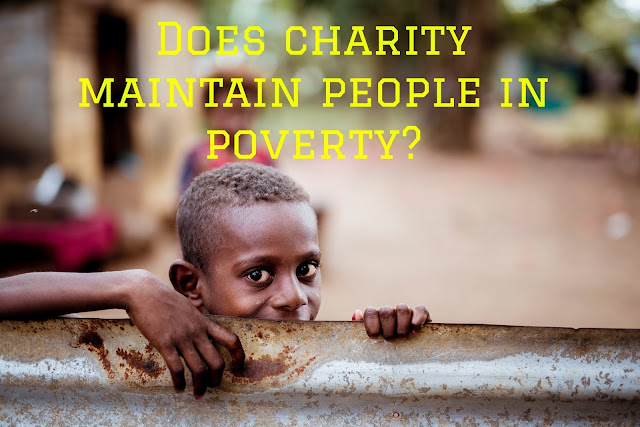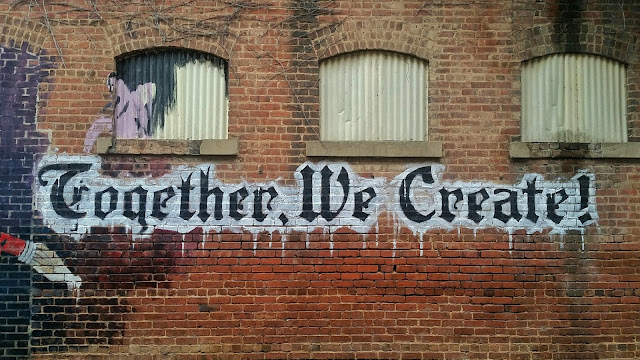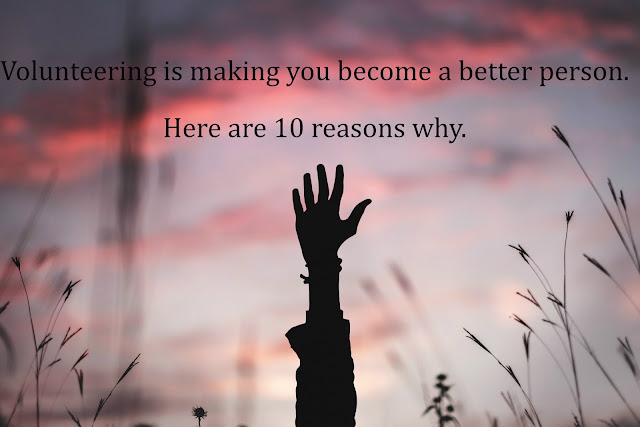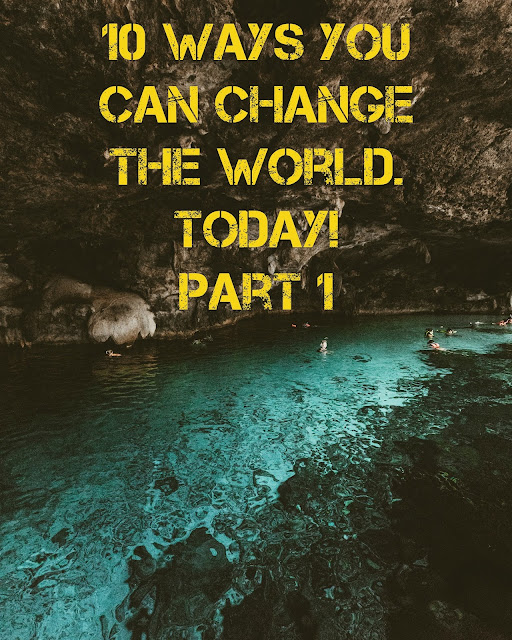Does charity maintain people in poverty?
 |
| Photo by Ben White on Unsplash |
We all have seen pictures of sad children in poor countries, people who have lost theirs homes because of natural disasters, people who need food, clothing and water... people in need who live in extreme poverty. Nowadays, there are many charity organizations who seek financial or other kind of aid from people in rich western countries in order to help those unfortunate people in the poor ones. People send clothing, food, make donations, volunteer to help those who are in need.
Do
you know that rich countries send billions of euros/dollars
every year to struggling third world countries. Billions!
Just to give you an insight, according to Giving USA 2017, American
individuals, estates, foundations and corporations contributed
$390.05 billion for total giving in 2016. Can you imagine?
This is a lot of money!
Now we can definitely say
that after all, we are actually truly generous, kind and
compassionate people, wanting genuinely to help the
others. I find this fascinating and it makes me
believe more and more that this world still has a chance to become
a better place and that we can make a difference together, by
joining our hands.
However, this is all
great, but maybe now you are asking yourself : well, if we are so
generous and we donate so much money and other material matters to
poor countries, why don't we see any improvement? There are
still many poor and starving people even though according to The
International Poverty Line today “only” 10% of the world's
population lives in extreme poverty, while in 1990 they were 30%.
So, what does extreme
poverty actually means? People are considered to be in extreme
poverty when they live on less than $1.90 per day. $1.90! This is
extremely low comparing to the amount of money people spend on a
daily basis in the western countries. And yes, it is maybe true that
nowadays less people live with less than $1.90 per day, but what
about the people who live on $3, $5 or $10 per day? They still live
in poverty! Also, we don't have to forget that the levels of
deprivation are still very common in many countries which means
that inequality remains!
It looks like the
billions of dollars that we donate each year don't really end the
existence of poverty. Why is it like that? There are so many
billionaires nowadays who can actually make a donation of let's say
$100 millions and solve a couple of problems in a developing country.
And actually, many rich people make donations to charities and work
on projects in struggling countries in order to improve their
economics. Where is the problem then? Is charity really helping?
Actually, there are many
problems and it is all connected. Charity helps! But for a
short period of time. In the beginning of a crisis it is
crucial to help people. For example, after an earthquake or
another natural disaster or a war, when people have lost theirs homes
and have nowhere to go or nothing to wear and eat, it is very
important to help them. This is where charity's work comes very
useful. But after this first period of crisis passes, charity can
become even toxic.
Do
you know the feeling when you get something for free and you get it
all the time? Without paying anything in return? You lose
the value of it. You stop appreciating what you have
because you didn't work for it. Or do you know people who have always
relied on their parents or friends for everything and have rarely
done something by themselves? They are not capable to take
responsibility for theirs actions and to be independent. It is
the same thing with charities who continue their work for too long in
struggling countries – at some point, we don't make these people
a favor anymore, we make them become dependent and passive.
Excessive donations are also a reason to completely destroy the
local economy of a country. But before seeing all these
consequences of excessive charity work in struggling countries, let's
first see why poor countries are actually poor. Is it their fault? Is
it the economic system's fault? Why do poor people exist?
Why are poor countries poor?
Is it because of
corruption? Or it is maybe the government's fault? Or the internal
policy failures? Actually, many people think that poor countries and
people living in extreme poverty exist because of the last reason –
internal policy collapses which means that it is the government's
and the internal laws' fault. And, of course, bad national
distribution of goods.
The truth is that these
reasons are obviously a part of the problem, but not the big
reason for it. Poor countries don't necessarily need western
countries in order to go out of their poverty (many people think
that without aids from rich countries, poor ones are lost which is
not true). Actually, the real reason why some countries are poor and
others are not, is the global economic system which works well
for some countries in the world (rich and powerful western countries)
and not so well for other countries (the developing ones). The reason
for that is that this systems has been designed over 500 years
ago, when the colonialism started. You
can see now that the society and the world changed since that time.
People's needs and lifestyle, as well.
So, what actually happens to the money we donate to poor countries?
This means that for
example, the money we donate to poor countries, actually, flows
the opposite way – from the poor countries to the rich ones.
Why is like that? Often, when a country makes a donation to
another one, it is not really for free. We think that we donate
our money to poor countries because we are very generous and want to
help them and that's it, no strings attached, but this
is not really the truth. When a country makes a donation to
another one, that comes with some sort of obligations – like
for example vote for the benefactor in UN agreements or they have
debts towards the benefactor (they have to pay loans to western
banks).
Another big reason for
poverty are illicit financial flows in form of tax evasion.
Multinational companies which operate in poor countries, but have
theirs headquarters in rich ones, steal wealth from developing
countries and put it in tax heavens. It is possible to do that
because of the rules written by the World Trade Organization that
makes it possible. It is very difficult to track transfers.
The World Trade Organization is ruled by a small number of rich
countries which decide “the destiny” of the world. Poor
countries have no actual power in decision making.
Jason Hickel, the author
of “Divide” says that “These financial flows outstrip the aid
budget by a factor of 10. So for every dollar of aid that poor
countries receive, they loose 10 dollars to multinational tax
heavens. Another one is debt service. Poor countries pay
200 billion dollars per year in debt service to banks in rich
countries.” “That's just the interest payments on debt, many of
which have been payed-off already, many times over, some of which are
accumulated by legitimated dictators... That outstrips the aid
budget by a factor of two”.
This shows us that it
is actually false when we think that rich countries have nothing to
do with the impoverishment of poor countries. Now let's see what
happens to the local economy when we donate to much.
The local economy is destroyed.
Yes! To much donations
make the local economy of a country lose its power. For every bag
of rice we send, a local agriculture loses his clients. Small
local business are dying slowly from charity when the charity work
continues for too long. As I already said, charity is important
in the beginning of a crisis, but when it continues for too long it
starts making people dependent and it is killing the small business,
the work of local producers and salesmen. For example, when people in
poor countries receive for free clothing from the US, they don't buy
the clothing produced in their own country. That means that a local
business is dying, is loosing its potential clients. The result of
the dying local economy is the growing poverty in the country.
So, the initial good intentions, could become a disaster in the
long run when overdone.
Another very important
thing is to see what is the impact of overdone charity on people in
poor countries. Too much charity and free supplies
make people become dependent.
People need to be
actors in their own life in order to feel good and useful. One of
the biggest people's needs is the need to have responsibilities.
To be responsible for something or someone. It makes you feel
important and useful. When we get everything we need for free, we
stop valuing it. We become lazy and passive. Overdone charity
does not really help people become stronger and independent
individuals. It is actually the opposite, it makes them feel
pathetic and become dependent. When charity continues for too
long, people start thinking that they are incapable of doing things
by themselves, that they are hopeless and have no skills. They lose
the ability to provide for themselves and theirs loved ones. They
stop BELIEVING in their own strength!
I work with people who
live in poverty and this is something I see all the time. People
don't believe in theirs own capacities and capabilities. They
don't think they are good enough or smart enough because no body gave
them the chance to express themselves or to let them show what they
can do. Very often, poor people think that they are stupid, because
their whole life they have been called stupid. Nobody wanted to hear
them or to listen to them. It is very important to give these
people the opportunity to freely express theirs thoughts and
feelings. To give them the chance to dream and to think big.
We have so much to learn from them!
Poor people need to
believe that they can be the actors in their own life, that they can
make good decisions and take responsible actions. They need to
feel strong again and take in hands their life. We need to
understand that when we make something FOR somebody, we don't help
them! Only doing something WITH somebody can really help this
person in a long-term. This is the only way we can show them that
they don't need other people to do things for them, they can do them
themselves. This way, they could actually become, again,
independent individuals.
So the question now is
Why do we do it? Why do we prefer to lean on charity anyways?
The answer is : because
it is easy. It is easy to donate money, clothing or food.
You don't have to make much effort. You don't have to go to another
country or meet people who are different from you and have a
completely different life than yours. You can stay at your home and
just with one click make a donation or get rid of your old stuff
after the spring cleaning. Although, I think these are very important
steps to take in order to help one another in times of crisis, this
is not a solution to the big problem – ending the existence of
extreme poverty in the world. Unfortunately, we can not “fix”
what is wrong in our society only by focusing on the consequences of
the issue, but not on the root cause.
I know that in nowadays
society we hurry all the time. We are scared of loosing our time and
we are right – time is precious. But we have to understand that
easy and quick solutions are not always (or never) the best ones.
Very often it is far better to invest in the long-term process.
Yes, you are not going to see the results immediately, but when you
do, you will realize that all these years and efforts were not
worthless and you actually did not lose your time or energy and did
make a change.
One example that I can
give you from my personal experience from working with people who
live in extreme poverty, is something that we call People's
University. This is a place where poor and often non educated at
all people have the freedom to express theirs thoughts on a specific
topic. Many people will say that this is not going to change theirs
lives and they will still live in poverty 10 years from now. The
thing is that people who live in extreme poverty and have no
education, often think that they don't have an opinion, that they are
stupid and whatever they say is useless and inaccurate, so better
don't say anything at all and in my opinion, this is one of the
reasons for them to live in poverty. They believe they lost battle,
they are hopeless. Some of the people who now come to the
People's University and talk in front of everybody in the room are
people who 10 years ago were terrified of doing that. Now they have
the courage and the confidence to express themselves
and to say what they think even if the others don't agree. And we
know that even for well educated people sometimes it is difficult to
talk in front of a crowd. But it takes time! Everybody has
their own rhythm. This is a very personal process and we can
just guide and help people evolve, but not force them. They will
do what is necessary when the right time for them comes.
This also leads to
another very alarming point which is that
We are scared of poor people making decisions.
Actually, we don't want
poor people to make decisions, so we prefer to make them for them.
Powerful people who represent rich countries in big international
institutions know that it is very dangerous to give equal power to
developing countries. It is better if they are suppressed
and powerless. This way they can do what we tell them to do.
Once again, we can see that slavery still exist and that a handful
of rich countries make decisions for the world. Actually, we need
to understand that if there are people who live in extreme
poverty, that must be profitable for someone. As war is a way for
some people to earn a lot of money, it is the same with poverty –
while some people are starving, other are having theirs pockets
full.
The question now is
What can we do to change this reality?
We don't have to stop
doing charity work! Charity is very important and helpful in the
initial phase of a crisis. It helps a community to recover and step
back on their feet. But it does not have to continue for too
long. When it does, the process of recovery becomes a process of
becoming dependent and passive which completely kills people's
capabilities to be responsible for their own life.
So, instead of making
permanent donations to poor countries, we need to think of a way
to develop and to improve the community. The best way to that is
through investments and job opportunities. People have
to do something. They have to work. This is the only way one can feel
useful and helpful for the society, but also for theirs families. One
person once told me, that the worst thing in the world is not
really the poverty itself, it is to be seen as useless and incapable
of doing anything, like the world does not need you. This is the
moment when people start thinking that their life is meaningless. It
is very powerful to hear something like that, especially, when you
know that everybody deserves to be respected and to have a place in
the society like every other human being. Working is not only giving
you the possibility to earn money, but it is also giving you the
possibility to feel like you actually DO something for the society,
that your existence is not meaningless.
A great platform where
people give loans to other people in order to start working on theirs
projects is KIVA. I love their slogan “Dreams are
universal, opportunity is not”. If you want to support people
in poor countries or people who don't have enough money to realize
theirs dreams, I highly recommend to join this great community!
Another great thing that
we could do, instead of charity, is volunteering and actually,
doing something TOGETHER with the people we try to help. A
team work between the benefactor and the benefited is an amazing
way to give people the opportunity to see that they are actually
capable of doing something, that they have skills and
knowledge. Doing something meaningful WITH them and not FOR
them is the key here. It applies to other areas of life as well –
when other people do something for us, we don't actually learn
anything, we just get the final result. This does not allow us to be
the actual authors of our lives. Luckily, many NGOs offer volunteer
positions where the volunteer has to build houses, paint walls, draw,
read books, clean with the people from a community.
Talking about NGOs and
organizations to which make donations, do not forget to well
investigate them before doing so. Look for how the money for
theirs projects was raised, who the sponsors are, if they have some
detailed financial record on their website. You can check my article Are NGOs a huge business? Things to look for when choosing an NGO. where I talk about the things we should look for when choosing
an NGO.
And last, but maybe the
most important one and unfortunately, it is not in our power, is
democratizing the global institutions. An economic policy
reform is needed. A reform that gives the opportunity to every
country in the world, no matter if it is a big one, a small one, a
poor or a rich one, to has access to equal rights of vote in
international institutions, where poor countries don't have to feel
the obligation to give their voice and support a big donator, but can
actually make a real statement and take a position on a certain issue
that concerns them.
In the end, we need to
understand that the most important thing for every human being in
order to grow and evolve is to be capable to take control and be
responsible of their own life in the best possible for them way.
This is how one can become a strong and independent
citizen who feels empowered and actually makes a difference in
the world. It is a slow process of learning. It takes time
and courage. It does not happen over night and this is why
helping and supporting each other in difficult times by thinking, doing, making, creating TOGETHER is so important.
It is a team work that changes lives. Love, Elena
References :
Global Extreme Poverty by Max Roser and Esteban Ortiz-Ospina, March 27 2017 https://ourworldindata.org/extreme-poverty#extreme-poverty-in-a-historical-perspective
Aid programs keeping countries in poverty by Renegade Inc https://renegadeinc.com/aid-programs-designed-keep-countries-poverty/
How to make sure your charity doesn't keep people poor by James Huenink, October 25 2016 http://thefederalist.com/2016/10/25/make-sure-charity-doesnt-keep-people-poor/
GivingUSA Official Press Release 2017, June 12 2017 https://givingusa.org/giving-usa-2017-total-charitable-donations-rise-to-new-high-of-390-05-billion/
GivingUSA Official Press Release 2017, June 12 2017 https://givingusa.org/giving-usa-2017-total-charitable-donations-rise-to-new-high-of-390-05-billion/



Heya! I’m at work browsing your blog from my new iphone! Just wanted to say I love reading through your blog and look forward to all your posts! Carry on the fantastic work!
ReplyDeleterice with least amount of arsenic